Everyone is Asking the Same Question After Hearing Our Story: "What Can I Do to Help?"
The answer is to keep speaking up and spreading hope. Get out of your comfort zone and connect with new people. The safe and effective narrative is finally being questioned en masse. Our time is now!
Written by WCH Operations Manager Nic Robinson
During our recent vision meetings, the World Council for Health team emphasized the importance of escaping our echo chamber and connecting with people who are in need of support and who would benefit from hearing our message.
This includes the vaccine-injured, those who are unaware of their vaccine injuries, families of the vaccine-injured and bereaved, those seeking an alternative to the failing UK health system, and those simply ready to ask questions about some of these things.
Additionally, we aimed to inform and advise people who may not be aware of the proposed amendments to the World Health Organisation’s International Health Regulations (IHR).
Our team had a bustling summer attending festivals and events, receiving overwhelming support for our work. However, we must now gather courage, step forward, and amplify our voices in previously unexplored communities.
Simply put, it’s time to get out of our comfort zones.
We made a collective decision, both staff and volunteers, to set about on a journey to town centers in the Southwest of the UK.
We are grateful to David Charalambous for his kind generosity in providing us with invaluable training on how to effectively reach people on somewhat challenging or potentially divisive topics.
In the historic city of Bath, where our office is located, we’ve already had a run-in with our local council who described our work as ‘compromising their vaccine roll out’. Expecting pushback from the council if we set up anything substantial, we knew we would have to be flexible and mobile.
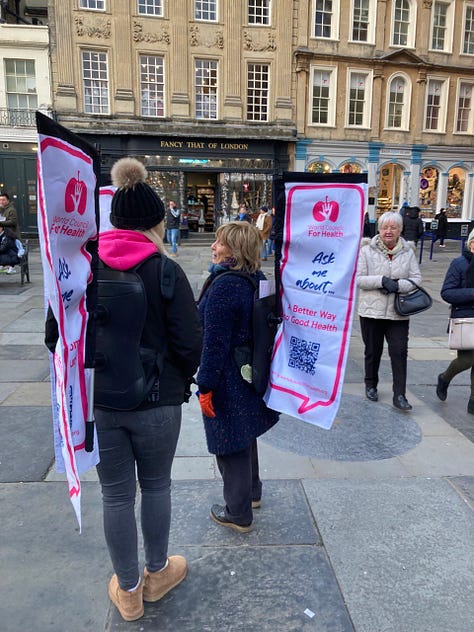

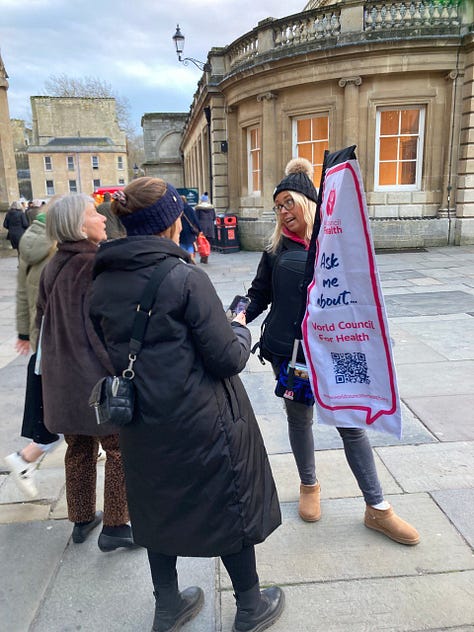
And so, equipped with flags and informative leaflets, we embarked on a mission to convey our message in Bath and other local communities around us.
With flags attached to backpacks, we were free to roam city centres without a fixed site and our hands were free to give out Spike Protein Detox leaflets, Great FreeSet stickers, WCH badges, and more.
The Cognitive Dissonance is Fading
Our key messages were health sovereignty, support for vaccine injury, and the work of the World Council for Health. We needn’t have been nervous about exiting our echo chambers and our comfort zones; the reception was better than we could have hoped! People were eager to hear our message and excited to talk.
In Tetbury, it was humbling to hear the many people who came up to us to thank us for what we are doing, including holistic practitioners who are treating the injured. It was a privilege to hear heartbreaking family stories of loss and injury. Many were coerced into getting the jabs and have suffered as a result.
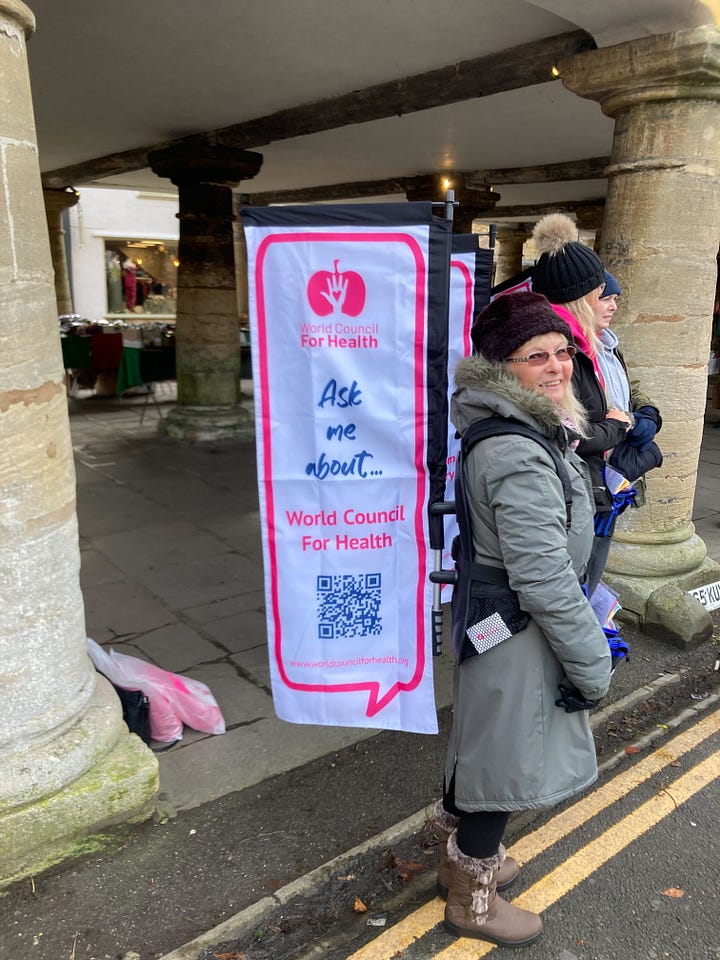
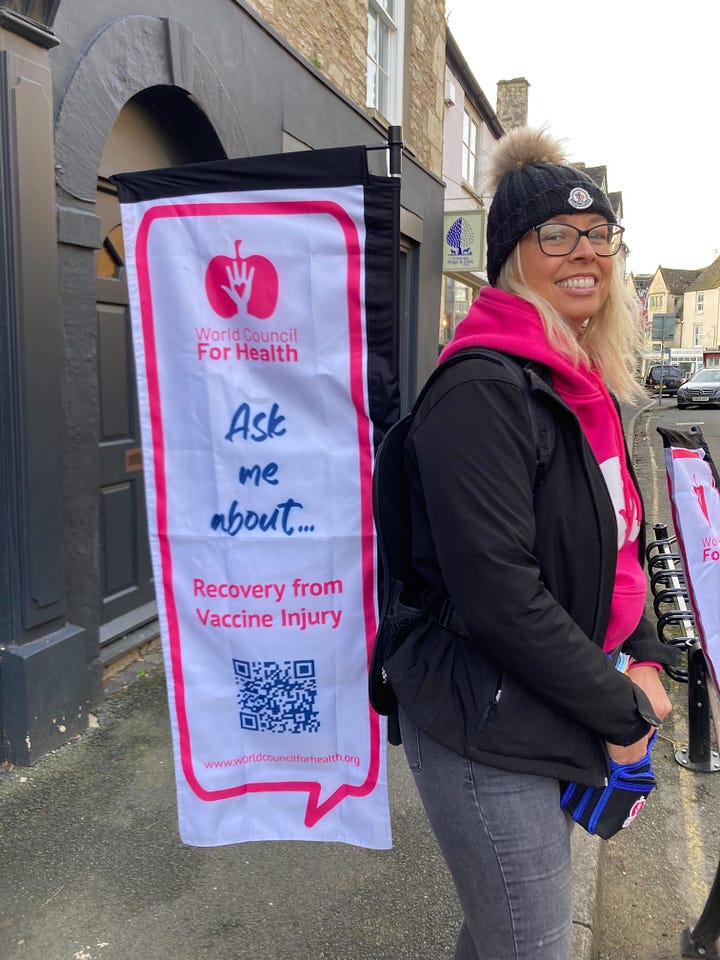
In Chippenham, we heard stories of injured partners, mothers, fathers, nephews, and nieces. Some only connected the dots after speaking to us. Myocarditis was a common theme, along with Long Covid-type post-vaccine illnesses. Not a single person we spoke to plans to take more Covid jabs.
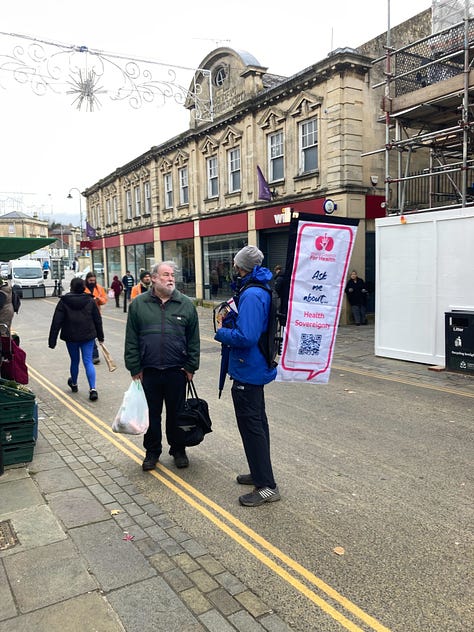
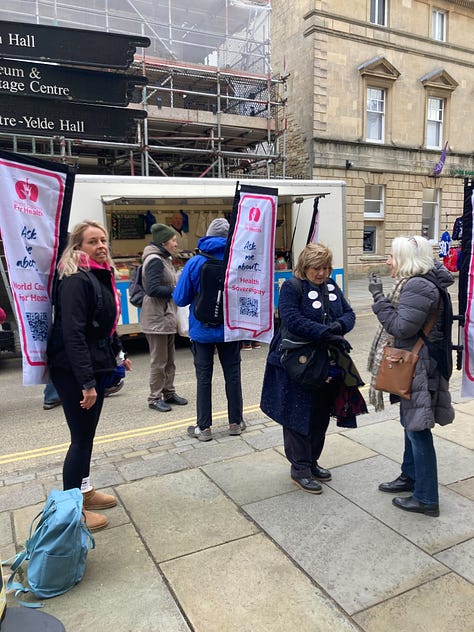
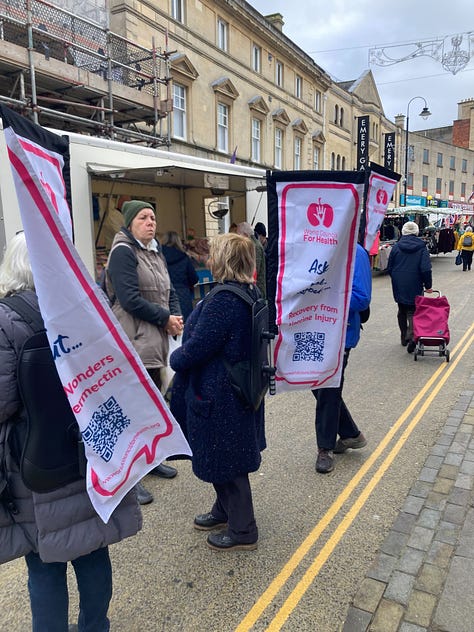
There were no confrontations. It seems cognitive dissonance is fading and becoming a thing of the past. The safe and effectivenarrative is finally being questioned en masse.
Those passing by in cars were seen mouthing the words vaccine injury as they read the words on our flags, seeding the thought that vaccine injury is not misinformation. Even those who believed that the vaccine rollout had saved lives thanked us for being there.
We found common ground with many. We should be angry with governments for the lies and half-truths, not with each other.
While we learned many things at these outreach events, perhaps most importantly we were reminded that stories are powerful. Stories have been passed down from fathers to sons and from mothers to daughters for generations. They paint a picture of how things used to be, about what our ancestors believed and how they acted, and of what influential things happened in the past. Personal stories remind us, that no matter how the landscapes may change, we are all faced with the same issues in the struggle, we are all parts of the same whole. Storytelling helps us forge connections and helps us heal the divide. Stories bind communities together. Stories foster trust and build relationships.
We also learned that there are many more unvaccinated people out there than we were led to believe. Naturopaths and other holistic modalities, once marginalised and mocked, deserve a place in our society. These practitioners are grateful for the support of WCH.
Outreach events like this generate grapevine conversations. The more we share our stories, the sooner we can start to rebuild strong, healthy communities. Amongst our ancestors, storytellers and orators were regarded as some of the most important people in society. They held and shared knowledge.
We are often asked here at WCH, what can I do to help? The answer is to keep speaking out and spreading hope in your community. Order flags of your own or make signs to use in your community where you can have these same vital conversations that so many people are now ready to hear.
Thank you for reading. If this content resonates with you, please share it.
Events like this would not be possible without your support. Thank you for supporting the work of WCH—we are truly making a difference on the global stage and in our local communities, and your support and donations are helping us in this vital work.
We will be outside with our flags and leaflets in London on Parliament Square on 18thDecember for the hearing of Dr Tess Lawrie’s petition to the UK Parliament to debate the proposed amendments to the World Health Organisation’s International Health Regulations.
We need many voices in Parliament Square on the 18th to show our MPs how important this issue is—will you join us? The World Council for Health team would love to see you there!
If you find value in this Substack and have the means, please consider making a contribution to support the World Council for Health. Thank you.

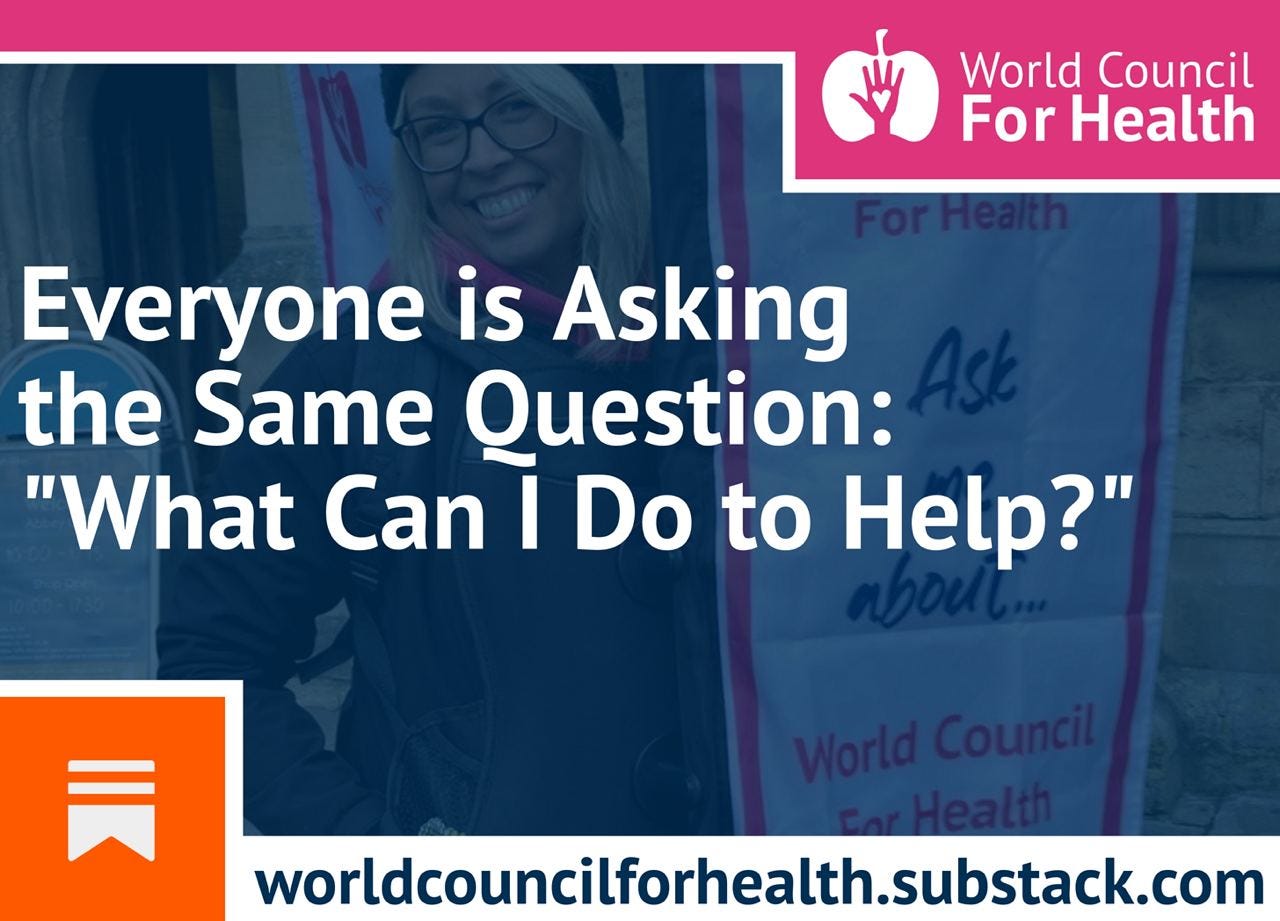
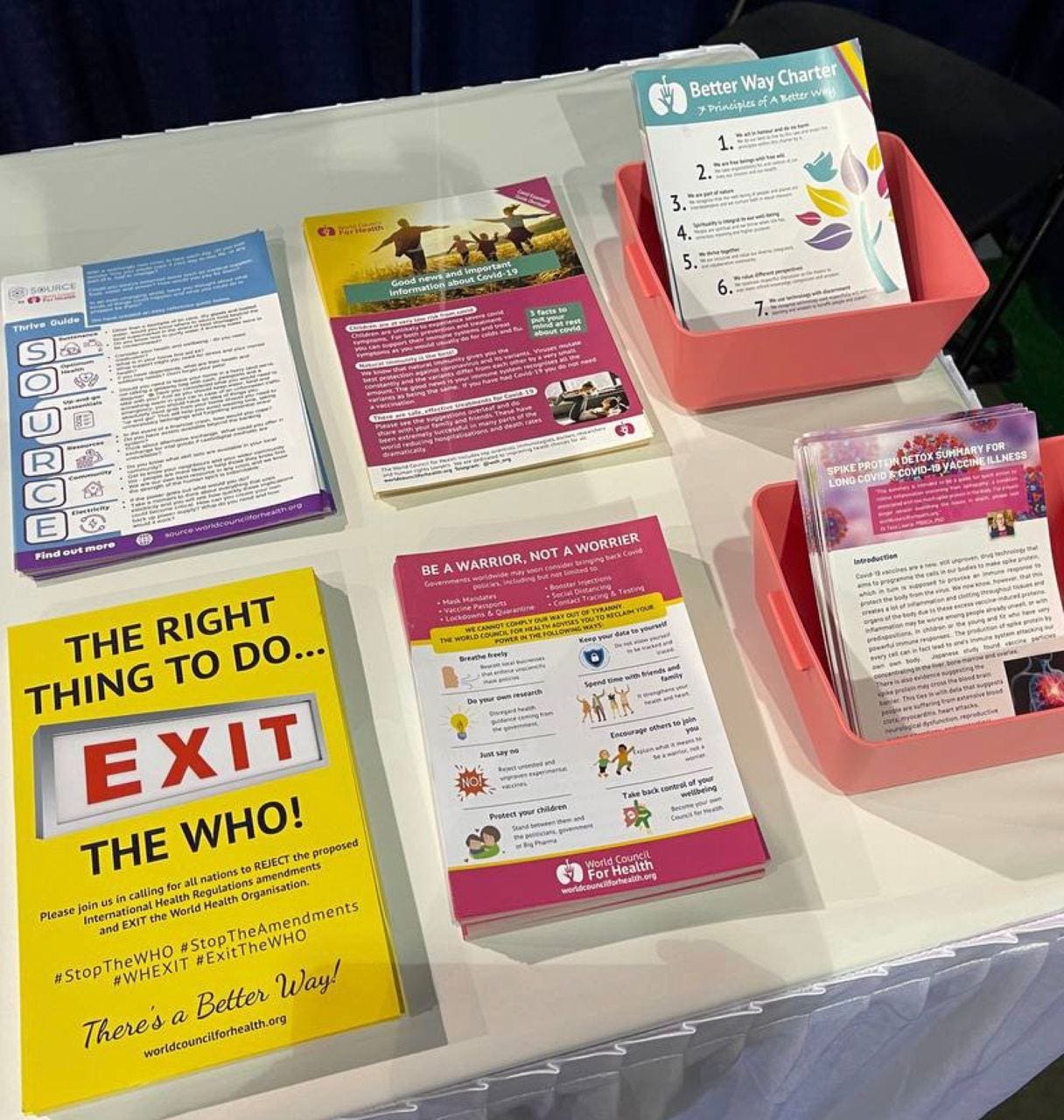

No comments:
Post a Comment